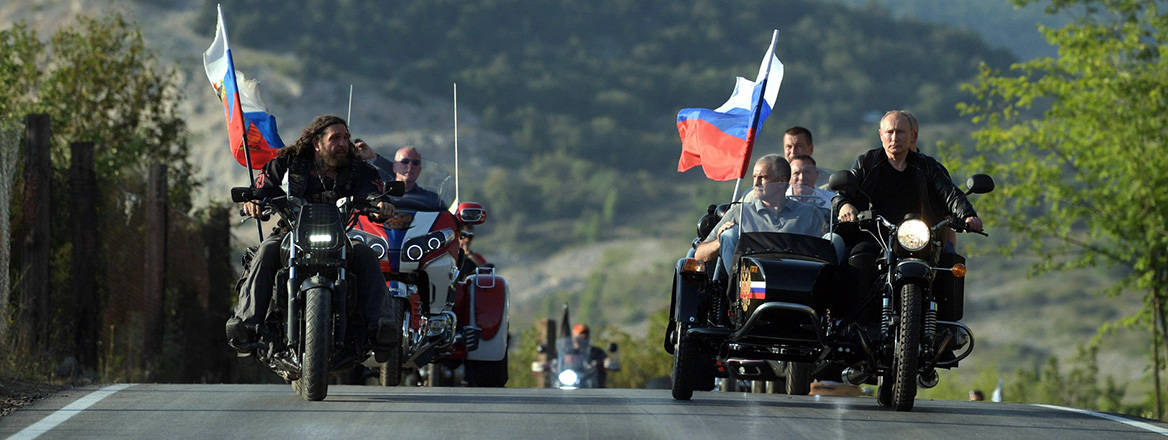If Russia is Serious about De-Nazification, it Should Start at Home
With its claims of ‘denazification’ of Ukraine, Russia has successfully directed international media attention towards far-right trends in Ukraine. However, while the presence of far-right actors in Ukraine should not be ignored, reporting on these actors has distracted from the prominence of the far right in Russia – both in the form of domestic extremist violence and through the Kremlin’s strategic support for far-right actors around the world.
When Vladimir Putin ordered the invasion of Ukraine on 24 February 2022, he stated that the goal of his actions was to ‘denazify’ Ukraine and to protect the people of Donbas from an ‘abusive’ and ‘genocidal’ regime in Kyiv. While this narrative of ‘denazification’ was mainly aimed at a domestic Russian audience, with the West emphatically discrediting such claims, it has led international media to scrutinise far-right tendencies in Ukraine – particularly in the context of the infamous Azov Movement.
Certainly, anti-Semitism and other elements of far-right ideologies are present in Ukraine – as they are in most other countries – and the issue of far-right extremists from Europe and North America joining the conflict in Ukraine as foreign volunteers deserves serious attention. Nevertheless, reporting extensively on far-right extremism on the side of Ukraine not only plays into Putin’s hands, but it also distorts the magnitude of this issue in Ukraine. Far-right parties only reached around 2% of the vote in the last parliamentary elections in 2019 – a figure much lower than in many European countries.
It also distracts from a much more extensive far-right problem that exists in Russia, ranging from the presence of domestic far-right terror groups to the Kremlin’s support for Russian far-right actors in earlier stages of the conflict in Ukraine and its strategic enabling of international far-right networks. The friendly relationship between Putin’s regime and the global far right has once again become apparent in the way far-right actors in the West have reacted to the recent outbreak of fighting. Yet, these links rarely receive the attention that, for example, the Ukrainian far right has received in recent weeks.
Ambiguous Relationship with Domestic Far-Right Groups
While Putin’s calls to ‘denazify’ Ukraine imply a complete absence of violent far-right movements in his own country, the level of political violence in Russia inspired by far-right ideologies has been staggering. Between 2000 and 2017 alone, 495 incidents of far-right political violence occurred in Russia, causing 459 deaths. This rate is five times higher than in the US and over seven times higher than in Western Europe during the same period, considering differences in population sizes. Since the early years of the Putin era, Russian security forces have largely tolerated far-right violence and terrorism, with repression slowly increasing from the early 2000s.
Russia’s conservatism and perceived ethnic purity, as well as the presence of Putin as a strongman with a nationalistic agenda, all serve as an inspiration for the international far right
While anti-Putin ethnic-nationalist and Orthodox monarchist groups – some of which took a pro-Ukrainian stance in the war in Donbas from 2014 onwards – continue to face prosecution, pro-Putin nationalist and far-right groups remain largely tolerated by the Kremlin. For example, Russkii Obraz, a neo-Nazi group with links to the far-right terror group BORN, received official government support as part of Putin’s policy of ‘managed nationalism’. Similarly, a far-right motorcycle gang called the Night Wolves enjoys a close relationship with the Kremlin and Putin himself, as demonstrated by personal meetings between Putin and the group, as well as state support provided for Night Wolves coverage on TV, including shows for children.
Weaponisation of Russian Far-Right Groups in Ukraine
Pro-Putin far-right groups in Russia have gained particular significance in the years following the annexation of the Crimean Peninsula and the subsequent war in Donbas. A mixture of Russian monarchists, neo-Nazis, Orthodox nationalists, Stalinists, and semi-criminal Cossack groups came together as the anti-Maidan coalition, acting in direct support of the Kremlin’s goals and capitalising on its close proximity to the regime. While Russia did not officially send troops to Donbas and other Russian-speaking parts of Ukraine, it did support and encourage pro-Russian ‘insurgents’ in Ukraine – many of whom were part of the Russian far right and the anti-Maidan coalition. Russian far-right foreign fighters in eastern Ukraine were also joined by members of far-right groups from Europe and elsewhere. For example, between 70 and 300 Serbs, most of whom were linked to far-right and ultranationalist groups, joined the conflict in Ukraine on the Russian side from 2014 onwards.
Overall, far-right actors – recruited both from Russian far-right groups and from groups around the world – played a much more significant role on the Russian side of the conflict than on the Ukrainian side, even though international media rarely picked up on this trend. While the situation in the current conflict is likely different, with lower numbers of foreign far-right volunteers joining the Russian side of the war, mercenary groups such as the Wagner Group – which itself has links to the far-right – are active in the war in support of Russia.
Strategic Support for the Far Right in Europe and North America
Aside from the Kremlin tolerating or condoning certain far-right groups domestically to help it achieve its political and strategic goals, Russia also plays a central role in the transnational far-right movement. On the one hand, Russia’s conservatism and perceived ethnic purity, as well as the presence of Putin as a strongman with a nationalistic agenda, all serve as an inspiration for the international far right, who look at the ‘Russian way’ as a model for their militant far-right struggle. At the same time, Russia also actively supports and facilitates relationships between Russian stakeholders and institutions and far-right parties and groups in Europe and North America. Such links are maintained through informal channels – such as Russian far-right, pro-Kremlin activists and soft-power institutions establishing relationships with far-right leaders around the world – and through official channels, such as diplomats or high-profile members of the Russian ruling party, United Russia, serving as contact points for Western far-right parties.
The West should not fall for Russia’s pretend moral outrage and pseudo-principled stance when it comes to far-right ideologies in Ukraine
In addition to establishing direct relationships with the international far right, Russia also supports far-right groups elsewhere by spreading disinformation, conspiratorial narratives, and anti-liberal messages, thus promoting societal polarisation in the West. Far-right groups within Russia such as the Russian Imperial Movement, with the Kremlin’s tacit approval, also give direct support to their international counterparts by providing combat training at paramilitary camps in Russia. European members of far-right groups who were trained at such camps have, for example, been involved in the bombing of a refugee centre in Sweden in 2017.
In parts of Europe that are home to Slavic and Orthodox populations, such as the Western Balkans, Russia encourages anti-Western/anti-European far-right movements by highlighting ethnic, religious and linguistic links to Russia, promoting a common Slavic identity and shared ‘Eurasian values’, which stand in stark contrast to liberal European and Western values. Links are facilitated through investments in cultural and religious exchanges, Russia’s media presence in the region, activities of Russian far-right groups such as the Night Wolves and the Cossacks Motorcycle Club in the Western Balkans and elsewhere, as well as support for ‘youth patriotic camps’ for Slavic youths in Russia. As mentioned above, the conflict in Ukraine from 2014 onwards also attracted significant numbers of foreign fighters from the region, most of whom joined the war on the pro-Russian side.
Through its strategy of condoning, enabling or directly supporting the far right domestically and internationally, the Kremlin serves its own agenda by stirring up polarisation and domestic tensions around the world, destabilising Western democracies, and fuelling anti-Western sentiments in places such as the Western Balkans with the aim of weakening the unity of the ‘West’. While issues relating to the far right in Ukraine should be taken seriously, the West should not fall for Russia’s pretend moral outrage and pseudo-principled stance when it comes to such ideologies in Ukraine, given its opportunistic exploitation of far-right groups and ideologies whenever it serves Russia’s goals.
The views expressed in this Commentary are the author’s, and do not represent those of RUSI or any other institution.
Have an idea for a Commentary you’d like to write for us? Send a short pitch to commentaries@rusi.org and we’ll get back to you if it fits into our research interests. Full guidelines for contributors can be found here.
WRITTEN BY
Claudia Wallner
Research Fellow
- Jim McLeanMedia Relations Manager+44 (0)7917 373 069JimMc@rusi.org


